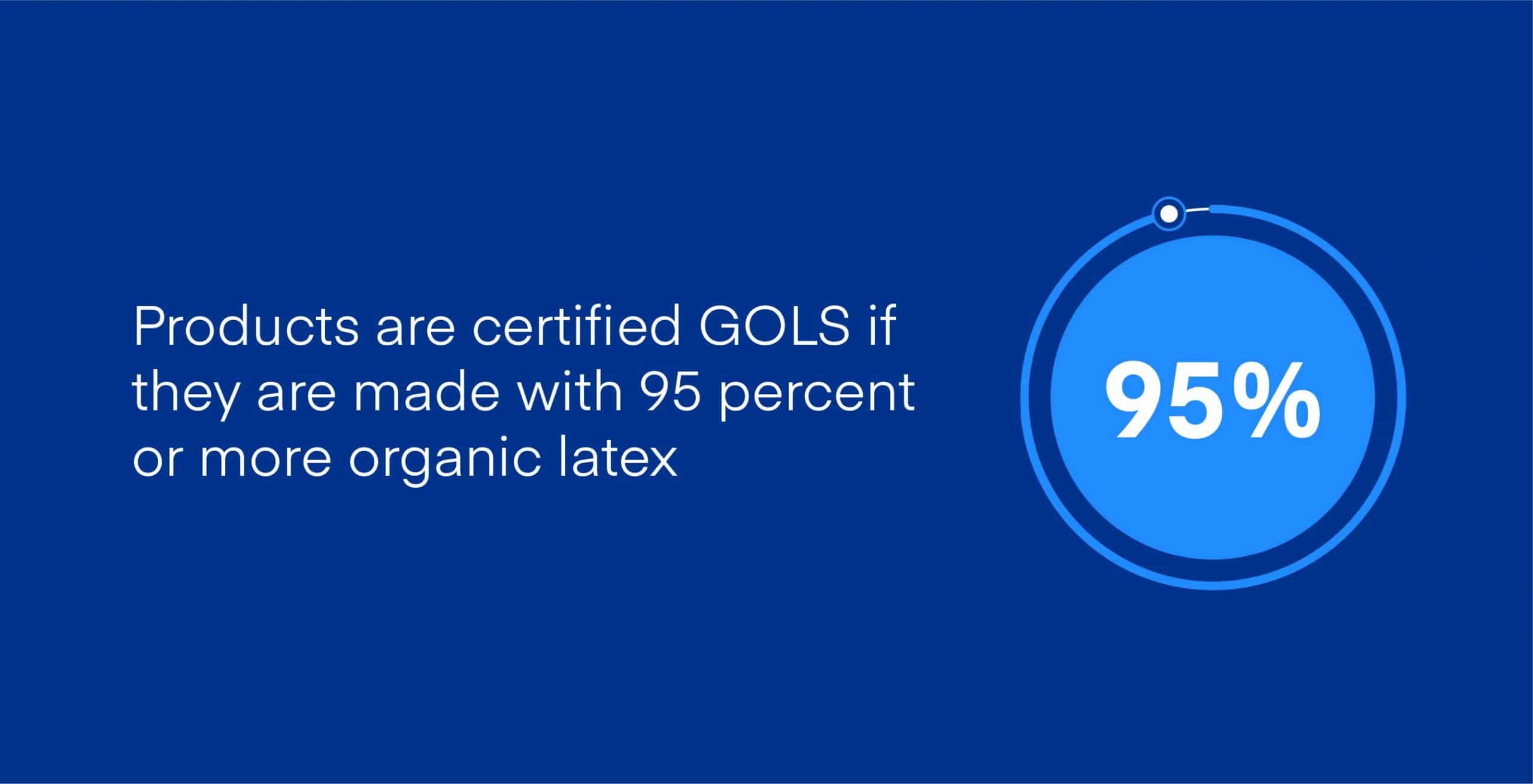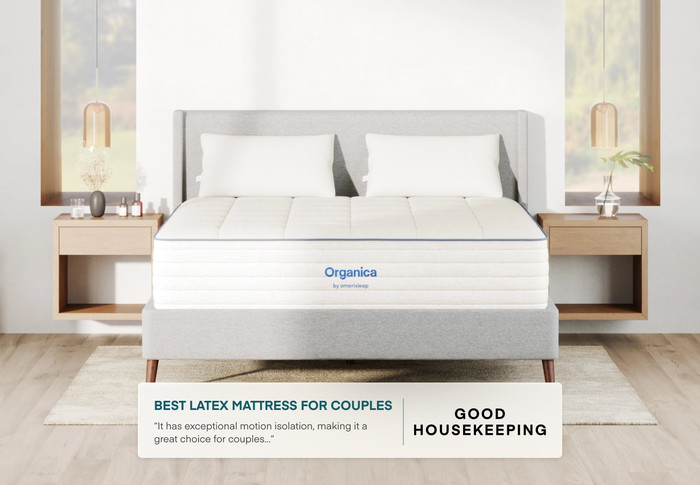Key Takeaways
- Certification and Standards: GOTS (Global Organic Textile Standard) and GOLS (Global Organic Latex Standard) certifications ensure the authenticity and organic integrity of products. GOTS covers textiles made from naturally grown fibers such as organic cotton, wool, bamboo, and silk, while GOLS certifies natural latex mattresses, toppers, pads, and pillows.
- Guidelines and Criteria: From using chemical-free fertilizers and pesticides in farming to restricting harmful chemicals and ensuring fair labor practices in manufacturing, these certifications prioritize sustainability and ethical practices. Environmental guidelines focus on waste reduction, water treatment, and the use of eco-friendly packaging materials, while social guidelines emphasize fair employment, safe working conditions, and non-discriminatory practices.
- Consumer Considerations: These certifications guarantee that products are free from harmful chemicals, pesticides, and volatile organic compounds (VOCs), making them suitable for individuals with health conditions such as respiratory illnesses or sensitivities to certain substances. Additionally, GOTS and GOLS labels are visibly displayed on certified products or can be verified through their public databases.
If you are an eco-conscious consumer concerned with the authenticity of organic merchandise, we suggest purchasing products backed by a GOTS (Global Organic Textile Standard) or GOLS (Global Organic Latex Standard) label.
The GOTS and GOLS certifications are globally recognized, endorsed by the USDA National Organic Program (NOP), and meet rigorous standards during the harvesting, manufacturing, packaging, labeling, trading, and distributing process.
In this article, we will discuss each standard, as well as the type of products eligible for a GOTS and GOLS certification.
What Is the GOTS Certification?
The Global Organic Textile Standard ensures the organic integrity of products from the moment they are harvested until they are packaged and labeled. Textiles formed from naturally grown fibers such as organic cotton, wool, bamboo, and silk may be eligible for the GOTS certifications. Such textile products include clothing, bed sheets, blankets, rugs, table cloths, and more.
The GOTS certification has two levels: made with organic and organic. Made with organic textiles are composed of at least 70 percent organic material while organic grade textiles are crafted from 95 percent or more organic fibers.
What Is the GOLS Certification?
The Global Organic Latex Standard is the first standard to regulate natural rubber, and it was pioneered by the Control Union—an international certification program promoting sustainable practices. Natural latex mattresses, mattress toppers, pads, and pillows are certifiable products.

Products are certified if they are made with 95 percent or more organic latex. If the latex includes additional fabric, such as cotton or wool covering, it must be GOTS or eco-INSTITUT certified. The eco-INSTITUT certifications guarantee household items are low in hazardous materials and safe to human health.
It is important to mention, while the USDA NOP recognizes GOLS, the two are not the same. If you see a USDA NOP label on a latex mattress or other product, it simply means the rubber trees used to harvest the raw material were grown organically. Global Organic Latex and Global Organic Textile standards have strict farming, manufacturing, environmental, and social test criteria.
Farming Guidelines
Farmers follow production standards set by the International Federation of Organic Agricultural Movements (IFOAM), an organization that assists farmers in growing sustainable organic agriculture. Their standards require farmers to use chemical-free fertilizers and pesticides to maintain soil quality, a strong ecosystem, and a healthy work environment.
Manufacturing Guidelines
The manufacturing process refines raw material into a latex or textile product. Even if these products began as natural fibers, processing them releases chemicals into the air, water, and workplace. The following standards prevent this from occurring by ensuring responsible manufacturing.
- Organic fiber must be clearly identified and separated from the conventional fiber.
- Dyes, process chemicals, and auxiliaries (zippers, buttons, ties, etc.), must meet basic biodegradability and toxicity levels.
- Auxiliary accessories containing harmful substances like PVC, nickel, or chrome are prohibited.
- Products cannot contain any harmful chemical inputs, such as synthetic sizing agents, heavy metals, formaldehyde, aromatic solvents, functional nanoparticles, or genetically modified organisms (GMOs).
- Rust-inhibiting knitting and weaving oils cannot contain heavy metals.
- Bleach applied before dying must be oxygen-based and free from chlorine.
- Azo dyes cannot release carcinogenic amine compounds.
Environmental Guidelines
GOTS and GOLS-certified brands minimize environmental waste and consumption by following these guidelines.
- Every machine operator follows waste-reducing procedures and is provided with an environmental policy with specific target goals.
- Wet processing units are responsible for sizing, bleaching, cleaning, dying, printing, and finishing products. This requires an ample amount of energy, chemical, and water consumption. Each unit tracks their level of consumption and waste, ensuring they do not surpass an acceptable limit.
- Used water is sent to a wastewater treatment plant, guaranteeing sustainability.
- PVC packaging material is prohibited. Additionally, all paper or cardboard labels and packaging are recycled or certified by the FSC (Forest Stewardship Council) or PEFC (Programme for the Endorsement of Forest Certification). These certifications confirm the paper or cardboard was harvested responsibly.
Social Guidelines
Consumers can rest assured every farmer and factory worker involved in the production of a textile or natural latex product is paid and treated fairly. The standards’ social criteria are based on the International Labour Organization’s key norms:
- Freely chosen employment (no forced labor)
- Right to collective bargaining or wage negotiation
- Safe and hygienic working conditions
- Convention of minimum age (no child labor)
- Non-excessive work hours
- Right to a living wage
- Free from discrimination
FAQ
What is the OEKO-TEX Standard 100 certification?
The OEKO-TEX Standard 100 label ensures textiles are free of or low in substances harmful to human health. The standard criteria require all threads, buttons, zippers, outer linings, and printings to be tested for unregulated toxic chemicals, such as heavy metals, formaldehyde, azo dyes, and nickel. Textiles are also tested for substances regulated by law but still considered hazardous.
Is the GOTS certification better than the OEKO-TEX® Standard 100 certification?
Both labels are globally standardized and guarantee a textile safe for use, but the GOTS label is more impressive because it certifies the entire life of a product was monitored. GOTS products are grown using petroleum-free fertilizers and pesticides then responsibly manufactured, packaged, labeled, and distributed. GOTS is also unique because it is an organic certification. The OEKO-TEX standard applies to organic and non-organic textile products.
Do I need an organic mattress?
If you or a family member has health conditions such as chronic migraines or respiratory illness, you may benefit from an organic mattress. Organic mattresses backed by a GOTS or GOLS certification ensures the bed is free from volatile organic compounds (VOCs). VOCs are chemicals used during the manufacturing process and include formaldehyde, toxic heavy metals, and chemical flame retardants. Although relatively harmless to healthy individuals, these chemicals can emit gasses into our homes and irritate people with the above conditions.
What is the difference between GOTS and GOLS certifications?
The GOTS and GOLS labels are extremely similar. Both of the standards track organic products from harvesting all the way through the supply chain. The main difference between the two is the type of material tracked. GOTS regulates textiles produced from organic natural fibers like cotton, wool, silk, and bamboo while GOLS regulates products refined from natural rubber such as a latex foam mattress.
How do I know if a mattress is GOTS or GOLS certified?
GOTS and GOLS labels are placed in an area visible to the consumer, usually on the packaging or hangtag of a final product. You can also find GOTS-certified products in the GOTS public database. If you want to check the genuineness of a label, simply enter the company’s name into the site’s free text option.
Conclusion
The GOTS and GOLS certification system guarantees finished products are constructed from honest organic materials. Their stringent requirements promote environmental sustainability, fair labor practices, and consumer satisfaction. Therefore, the global-wide standards are acknowledged to yield the safest and highest quality organic materials. Consumers that purchase GOTS or GOLS grade label products can rest assured their environmental stewardship makes a difference.
About the author
Mitchell Tollsen is a graduate student and a freelance writer who’s contributed to the Early Bird blog for three years. Mitchell’s always been fascinated by the science of sleep and the restorative processes our bodies undergo when at rest. The self-titled “Sleep Expert” is always looking for ways to improve his shut-eye, and throughout the years has implemented numerous lifestyle changes and tried dozens of sleep-promoting gadgets to determine the best ways to truly get better rest.
View all posts





